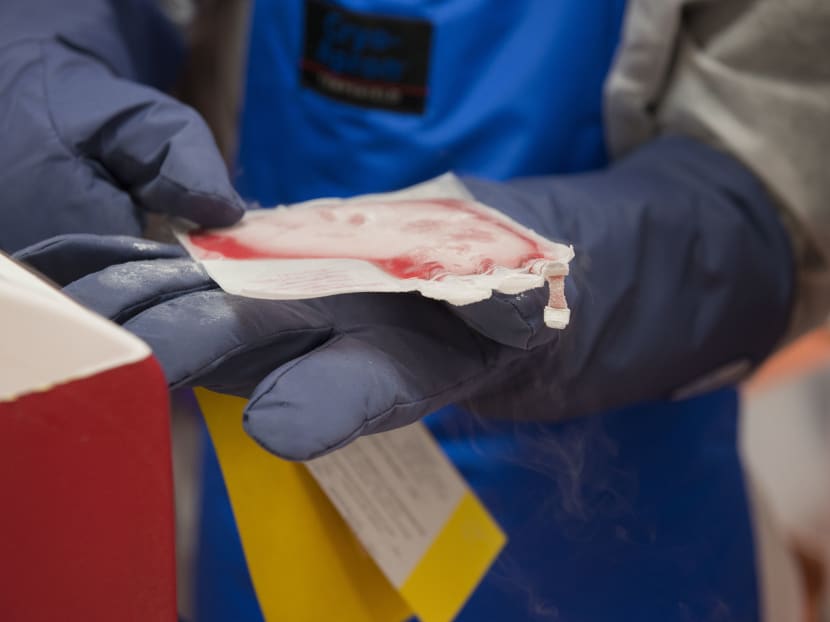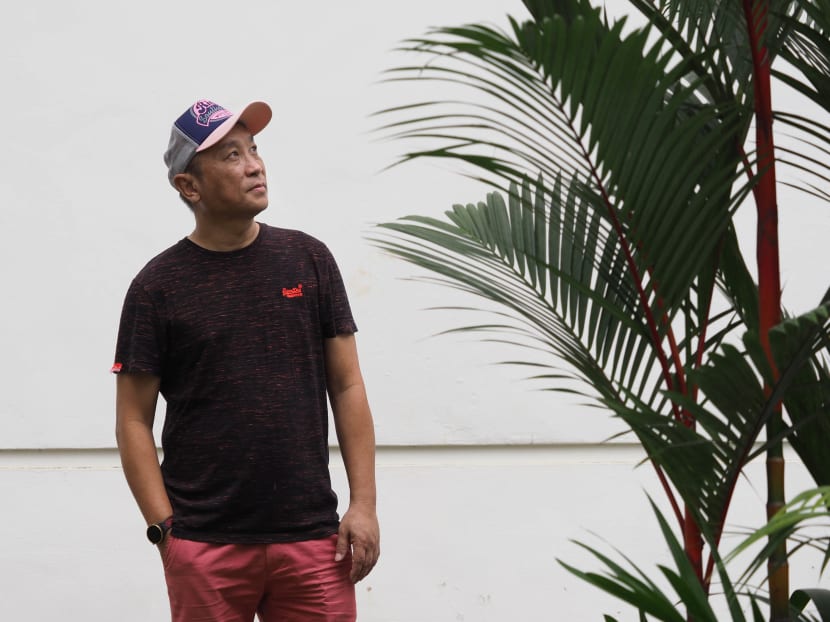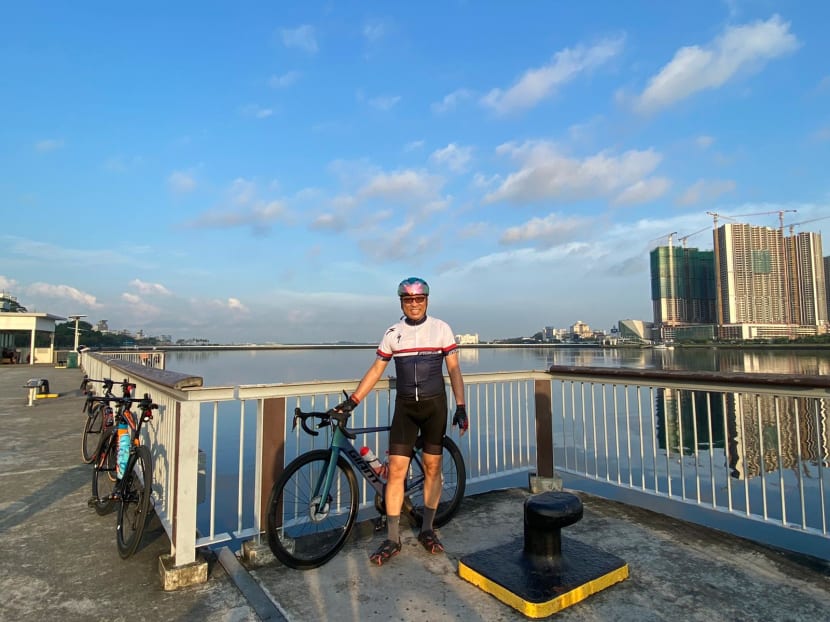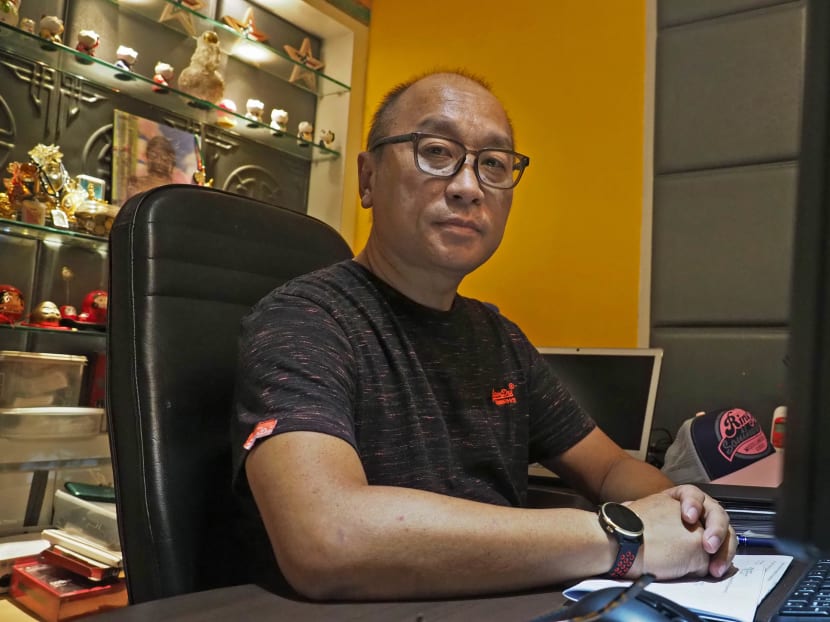To fight lymphoma, cancer patient first in Singapore to have T-cells genetically modified outside clinical trials
SINGAPORE — Cycling enthusiast Sam Tan used to ride up to 100km on weekends and was one of the fittest in his riding group. That all changed when the building maintenance and renovation contractor was diagnosed in 2017 with lymphoma, a type of blood cancer that affect a type of white blood cells called lymphocytes.
- A new cancer treatment called chimeric antigen receptor T-cell therapy has been approved by the Health Sciences Authority
- This is for commercial use on some patients with certain advance blood cancers
- It involves genetically modifying the patient’s own T-cells to target and kill cancer cells
- A 56-year-old lymphoma patient, who suffered two relapses, was the first in Singapore to try it outside clinical trials
SINGAPORE — Cycling enthusiast Sam Tan used to ride up to 100km on weekends and was one of the fittest in his riding group.
That all changed when the building maintenance and renovation contractor was diagnosed in 2017 with lymphoma, a form of blood cancer that affects a type of white blood cells called lymphocytes.
He has an aggressive type of the cancer known as diffuse large B-cell lymphoma.
Despite undergoing many rounds of chemotherapy and radiation therapy, which took a heavy toll on his body, the rogue cells in Mr Tan’s body kept returning with a vengeance.
He suffered two relapses, one in October 2019 and another in May last year.
When patients no longer respond well to existing cancer treatments, there are often limited options left for them.
Now, a newly approved treatment has offered Mr Tan a lifeline and a possible chance of keeping his aggressive cancer at bay.
He is the first patient in Singapore to have received Kymriah, a new type of chimeric antigen receptor T-cell (CAR-T) therapy, outside of clinical trials.
There are other types of CAR-T therapy but Kymriah is the first commercial CAR-T therapy in Singapore approved by the Health Sciences Authority (HSA) under a new cell, tissue and gene therapy products regulatory framework.
The treatment took place at Singapore General Hospital (SGH) in January this year.
The novel treatment involves genetically reprogramming Mr Tan’s own T-cells to target and kill cancer cells.
Also known as “fighter cells”, T-cells or T lymphocytes, are a type of white blood cells that help fight against infections and cancer cells.
T-cells and B-cells, the two main types of lymphocytes, work together to respond to antigens or foreign substances in the body.
However, sometimes, T-cells may fail to recognise or eliminate deadly threats in the body.
Mr Tan, now 56 and a father of two daughters aged 19 and 22, said that he underwent the treatment because he hopes to be able to continue to be around “for as long as I can” for his family.
HOW IT WORKS
Dr Francesca Lim, consultant with the haematology department at SGH, explained that T-cells fight against infections and cancers by finding proteins, called antigens, on the surface of foreign cells.
Dr Lim is also assistant medical director at the Cell Therapy Facility at HSA.
“Our T-cells have receptors that attach to foreign antigens and help trigger other parts of the immune system to destroy them,” she said.
“Cancer cells also have unique antigens but if your T-cells do not have the right receptors, they can’t attach to the antigens to help destroy the cancer cells.”
In CAR-T therapy, the patient’s T-cells are genetically modified to express a special receptor called a chimeric antigen receptor on their surfaces, Dr Lim said.
This helps them recognise the specific cancer cell antigens.
Kymriah is now used to treat some patients with certain types of advance blood cancers.
Swiss pharmaceutical company Novartis said that it is the first commercially approved CAR-T therapy in Singapore.
SGH is the first Kymriah treatment centre in Southeast Asia to become operational. There are ongoing discussions with National University Hospital for the treatment to be made available there.

Selected groups of patients are eligible for the treatment. They include:
Children and young adults from two to 25 years old who have B-cell acute lymphoblastic leukaemia, which is a type of cancer that affects the blood and bone marrow. It is the most common type of childhood leukaemia
Adults with diffuse large B-cell lymphoma such as Mr Tan. These patients are known as relapsed or refractory cases
For these patients, they would have to be those who have not responded to initial treatment and have received at least two lines of treatment but have also not responded to them.
Dr Lim said: “A majority of the patients with these cancers will respond to initial conventional treatment. It is the relapsed cases that are challenging to treat.”
For example, around three in 10 patients with large B-cell lymphoma will relapse and the next conventional treatment option they have is to undergo an autologous haematopoietic stem cell transplantation (HSCT).
An autologous HSCT uses a patient's own bone marrow or blood.
“However, not everyone is fit to undergo an autologous HSCT as it involves the use of very high doses chemotherapy and not everyone can have a successful haematopoietic stem cell collection,” Dr Lim said.
“Some patients relapse after an autologous HSCT and treatment options after that are limited.”
BATTLING CANCER THREE TIMES
For Mr Tan, fighting cancer thrice in a span of three years felt like an endurance race.
He first noticed a small lump at the lower part of his jaw in 2016 but thought it was not serious since it did not hurt.
He sought treatment the following year when a large lump appeared overnight under his chin. It turned out to be lymphoma.
“As a person who has been healthy my entire life, my heart dropped when I was told I have cancer. I had a lot of questions. One of them was, ‘How much time do I have left?’”
Determined not to let dark thoughts overcome him, Mr Tan kept up a brave front.
He told his daughters about the cancer only when the visible hair loss from chemotherapy made it difficult for him to conceal his illness.
From being fit enough to ride up to 100km every week, the side effects from cancer treatments left him winded and unable to even climb 10 steps without panting.
“I used to be one of the fittest in my cycling group. After chemotherapy, I was right at the bottom and am still last in the group, trying to catch up. But I won’t give up,” Mr Tan said.

“A positive mindset is very important for a cancer patient. If your thoughts are always on the darker side, every day will be miserable for you.
“You cannot feel like you are dying. You must fight it,” he added.
This never-say-die mindset kept Mr Tan going each time the disease returned. He also continued working despite his condition.
VERY HIGH FEVER, HALLUCINATIONS
As part of the CAR-T treatment, T-cells were collected from Mr Tan’s blood through a process called leukapheresis.
This is similar to donating platelets where blood is spun through a centrifuge and divided into its parts.
After collection, the cells were sent to the manufacturing facility where they were genetically altered to enable them to identify and attack the cancer.
Dr Lim of SGH said that the modified cancer-fighting CAR-T cells are grown in the laboratory and undergo stringent quality testing before it is channelled back to the patient.
The reprogrammed cells are infused into the patient’s bloodstream via a single infusion.
Mr Tan, who was monitored in the hospital after the treatment, experienced side effects. For about five to six days, he had a high fever that went up to 42.6°C.
He also had hallucinations and could not sleep properly for several days.
A patient education brochure on Kymriah states that the treatment may cause side effects that are “severe or life-threatening”.
The most common potential side effects include difficulty breathing, fever, severe muscle or joint pain, very low blood pressure, chills, dizziness, confusion as well as nausea, vomiting and diarrhoea.
The side effects result from an inflammatory response that may happen in the body as the CAR-T cells attack the cancerous cells.
Being bedbound for several weeks left Mr Tan with muscle loss but he recovered gradually.
Today, he has resumed cycling with his buddies. His fitness level is nowhere near his pre-cancer days but he is grateful for a new lease of life.

‘LIKE HAVING BIONIC CELLS’
Mr Tan said he was “fortunate” that his private health insurance covered around 90 per cent of his medical bills. The treatment, including the hospital stay, cost slightly more than half a million dollars.
While recent scans showed that there were no visible enlarged lymph nodes in his body, Mr Tan remains cautiously hopeful that the new treatment will keep the cancer at bay.
“I guess it is like having ‘bionic’ cells in my body to fight the lymphoma. Of course, I hope that this treatment will be a cure but no one can guarantee that at the moment,” he said.
When asked if a cure is possible with CAR-T therapy, Dr Lim of SGH said: “Indeed, that is the hope of (using) CAR-T cells. It is a major advancement in immune-based treatment strategies, where we try to harness and leverage the immune system to find and destroy cancer cells.
“CAR-T therapy is cell therapy, gene therapy and immunotherapy all in one, and this has truly revolutionised cancer treatment, hence the hope of ‘cure’.”










